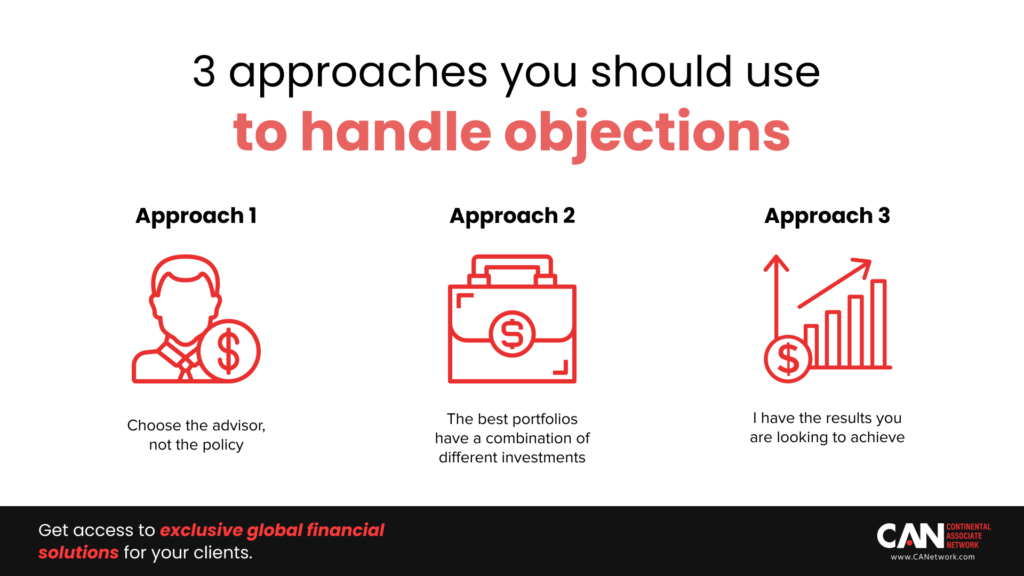It is pretty standard for financial advisors to be stopped while closing insurance sales in the name of product comparison. Clients often say that they will get back to you or that they think there might be a better price somewhere else.
Sometimes, your HNI clients may also compare insurance with other forms of investments and ask why they should invest here when there are better returns elsewhere? But as an Insurance advisor, you have to understand what they mean when they make objections like that. Only when you know their mentality can you jump over the hoops and convince them about your product.

Today, we will deep dive into the common objections made by HNI clients while buying insurance and how you can resolve the issues. Once you understand the thought process of your client’s complaints, handling it will become a lot easier.
What will we cover?
- Understanding why clients want to compare and what they correspond to
- Three approaches you should use to handle objections
Approach 1: Choose the advisor, not the policy.
Approach 2: The best portfolios have a combination of different investments.
Approach 3: I have the results you are looking to achieve.
But before we start, let’s first understand the mindset that clients have when they say they want to compare.
A few studies on consumer behavior have concluded that people compare before making a purchase decision because they want to find out which product or service will give them the best chance of getting the best results. So, how does this relate to the insurance profession? Well, usually, when a client says they want to compare, there are five objections.

Objection 1: They wish to use it as an excuse not to buy from you because you didn’t make it clear enough to understand why they need to purchase insurance.
Objection 2: They want to compare because they think they’ll get a better price somewhere else.
Objection 3: There is much information online nowadays, and they believe they can find the best option.
Objection 4: They misunderstand the nature of insurance and other investments, so they end up comparing apples to oranges rather than to apples.
Objection 5: They want to find the best Insurance advisors, and you didn’t show them that you are the one. Now that we are clear on why clients say they want to compare, the next step is to know how to take advantage of these insights and make a twist.
Also Read: https://canetwork.com/ultimate-guide-to-objection-handling-for-financial-advisors/
Let’s look at what kind of approach would suit the different reasons we have already discussed.

Approach 1: Choose the advisor, not the policy
Addressing objection 1: They wish to use it as an excuse not to buy from you because you didn’t make it clear enough to understand why they need to purchase insurance.
For this group of clients or prospects, your role as an insurance advisor is to help them see a new perspective of why they need insurance in the first place. Depending on the clients or prospects you are working with, you can use the following insurance concept presentations to help them understand what insurance does rather than focusing on the products. Once they get the ‘why’ clear, everything else will become easier.
Addressing objection 2 and 3:
They want to compare because they think they’ll get a better price somewhere else.
There is much information online nowadays, and they believe they can find the best option.
Why does buying from an expert matter?
For reasons number two and three, you need to understand that people tend to spend much time comparing when it comes to more expensive products and services. So, your role as an advisor is to make them understand that it is a very competitive era where most insurance companies will have identical product policies and prices. The crucial thing that people forget is choosing the right financial advisor.

Once you have chosen the right advisor, you need to follow the pattern and guidelines they provide you; it’s as simple as that. To help visualize better, let’s look at the first approach you can use for this group of clients.
You might get a widespread objection that your company’s plan is not as good as the other plans or that they want to compare your scheme to other companies.
In this case, you should address the issue by saying that this is a prevalent request. However, they should ensure that they’re buying the right product. You can use the analogy of how people choose the doctor first and then follow the guidance rather than selecting the medicines themselves. Follow it up by asking why they did not purchase the insurance from the other company if they were giving a better price?
Pointing out the importance of choosing the right financial advisor and then following their advice could help you seal the deal.
If your client still thinks they can get a bargain on the insurance policy, tell them how today’s insurance market is highly competitive and that most companies offer products at the same rate. What is even more vital for them is to have the right financial advisor, which is you.
At the end of the day, only four significant types of insurance are prevalent:
- Health Insurance
- Life Insurance
- Liability Insurance
- Retirement Insurance

The real question is, whom do they trust to get the right financial advice?
Approach 2: The best portfolios have a combination of different investments
Addressing objection 4: They misunderstand the nature of insurance and other investments, so they end up comparing apples to oranges rather than to apples.
To address reason number four, you must develop the client’s awareness.
Many people assume that insurance works the same way as other investments, so they will always compare insurance with different assets they’re planning to buy. Your job is to explain to them what a good financial plan looks should have.
You can use the fruit salad example to explain it. Tell them that no one can make a balanced fruit salad with one fruit; it should have multiple fruits like insurance, investments, properties, and bank accounts. These are all the different foods under the financial umbrella. The purpose of a retirement plan, an annuity, or insurance is different, and it is crucial to have it in your portfolio.
Further, mention how you only need 1 percent of their total investment portfolio to protect them from the future. One cannot compare insurance with any other investment because it does something that no other asset does.
It creates money that doesn’t even exist by protecting ten years of your annual income money that they still have not earned. The job of a financial advisor is to create money that doesn’t even exist, and it only requires one percent investment of your total portfolio size.
So, if their portfolio is growing at five or six percent, you only need that one percent to ensure that it is protected and can be transferred into cash whenever the need comes because cash is king.
Comparing returns on insurance with other assets
Another common objection that HNI clients often have with their insurance advisors is that they feel that their investments in insurance do not bring them the same returns as other assets. In these cases, you first have to acknowledge that you understand the difference in returns.
Then point out that these are two different types of investment and have their purposes in balancing your portfolio. The purpose of insurance is to provide you security and create money that doesn’t exist yet because it’s an income protection tool.
Also Read: https://canetwork.com/ultimate-guide-to-objection-handling-for-financial-advisors/
Making the product relatable to your clients is pivotal to making a sale.
Approach 3: I have the results you are looking to achieve
Addressing objection 5: They want to find the best insurance advisors, and you didn’t show them that you are the one.
Everyone wants to have the best advisor, and if you don’t show them that you are the one, then making a sale will only get more complex. It is a common occurrence after you finish your presentation or sales pitch.
To stop your HNI clients or prospects from comparing you with other insurance advisors, you need to give them overwhelming proof that you can deliver the results they are after.
You can use the third approach to handle such an objection. This approach is broken down into three steps:
Step one: Before the meeting, survey to determine why your previous and current clients chose you.
Step two: Prepare a comparison for your prospects before they even start doing it.
Step three: Provide more proof of how you have helped other HNI clients with their financial planning. The most obvious way is to use case studies and testimonials provided by previous clients who explain their great experience with your service.

These stories can work because people like to do what others are doing. Be sure to furnish at least four or five reviews to increase your chances. This will make you more relatable to your clients.
Step four: If you feel like your clients or prospects are convinced of your ability so far, you can start transiting to your closing. However, if they still hesitate and tell you something like they would like to think about it, you can bring up the free look period.
The free look period allows prospects to have a free trial duration to understand the benefits before closing on the product. Freelook periods can be anywhere between one to four weeks depending on the region and allow them to enjoy insurance benefits for free, resulting in a psychological commitment.
We hope you can use these strategies to close more high-value insurance sales with HNI clients. If you are looking for bespoke and globally accepted life insurance and legacy planning solutions, get in touch with Continental Associate Network for the best-customized insurance plans tailor-made for your clients!





